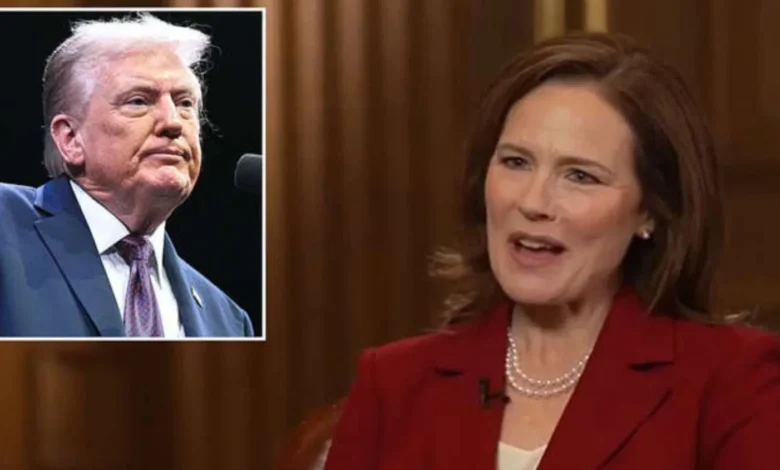Justice Barrett Responds To Possible Trump Third Term

U.S. Supreme Court Justice Amy Coney Barrett responded to President Donald Trump’s teasing about possibly running for a third term.
During a sit-down interview with Fox News anchor Bret Baier, Barrett discussed her upcoming book and answered questions about Trump and the legal landscape across America.
The 22nd Amendment prohibits individuals from being elected president more than twice. It was ratified in 1951, six years after Franklin Roosevelt’s presidency, during which he was elected an unprecedented four times.
Baier inquired about the text of the 22nd Amendment and constitutional interpretation.
“And for the folks who say, ‘Well, the Founders were dealing with completely different problems back then. They were not contemplating what a country could look like decades, decades later.’ How do you — you know, they want a living, breathing Constitution that changes. How do you respond to that?” Baier asked.
“The genius of our Constitution — and I talk about this in the book when I describe originalism, I describe our written Constitution — is that it’s written at varying levels of generality. So, sometimes it’s very specific. The president has to be at least 35 years old,” Barrett said.
“But sometimes it’s very general. We’re protected from unreasonable searches and seizures. We have freedom of speech. And to have freedom of speech doesn’t mean that you have freedom only to pass out pamphlets in a town square. I mean, it means that you have freedom to be on broadcast news,” Barrett added.
Baier jumped in and asked, “Right. And the 22nd Amendment says you can only run for office for two terms.”
Barrett responded, “True.”
“You think that that’s cut and dry?” Baier asked.
Barrett replied, “Well, that’s — you know, that’s what the amendment says, right? You know, after FDR had four terms, that’s what that amendment says.”
WATCH:
In a separate interview with CBS News senior correspondent Norah O’Donnell, Barrett argued that the U.S. Supreme Court “should not be imposing its own values on the American people,” as the nation’s highest court is being asked to review its landmark decision from ten years ago that made same-sex marriage legal.
Barrett argued that she wants Americans to “understand the law” and that it is “not just an opinion poll” based on what the nine justices think.
“You know, what the court is trying to do is see what the American people have decided. And sometimes the American people have expressed themselves in the Constitution itself, which is our fundamental law. Sometimes in statutes,” she said. “But the court should not be imposing its own values on the American people. That’s for the democratic process.”
The Supreme Court decided whether to overturn Roe v. Wade, the landmark 1973 decision that established the constitutional right to abortion, months after Barrett was approved by the Senate and sworn in as a justice.
In June 2022, the Supreme Court overturned that judgment, leaving it up to the states to decide who can get an abortion.
Barrett wrote in her book, “The court has held that the rights to marry, engage in sexual intimacy, use birth control, and raise children are fundamental, but the rights to do business, commit suicide, and obtain abortion are not.”
The U.S. Supreme Court is considering whether to hear a case brought by former Kentucky clerk Kim Davis, who is seeking to overturn the court’s decision in Obergefell v. Hodges, a landmark ruling that established the right to same-sex marriage across the nation.
The case, brought by Davis—a former Kentucky clerk who served six days in jail for refusing to issue marriage licenses to same-sex couples on religious grounds—could pose a significant challenge to federal protections for same-sex marriage nearly a decade after the Supreme Court legalized such unions nationwide.
Some justices, including Clarence Thomas, have signaled a willingness to revisit the issue in recent years, particularly as the court has shifted to the right.
If the court were to strike down the nationwide right to same-sex marriage, the matter would likely revert to the states—many of which have yet to pass laws recognizing these unions.





